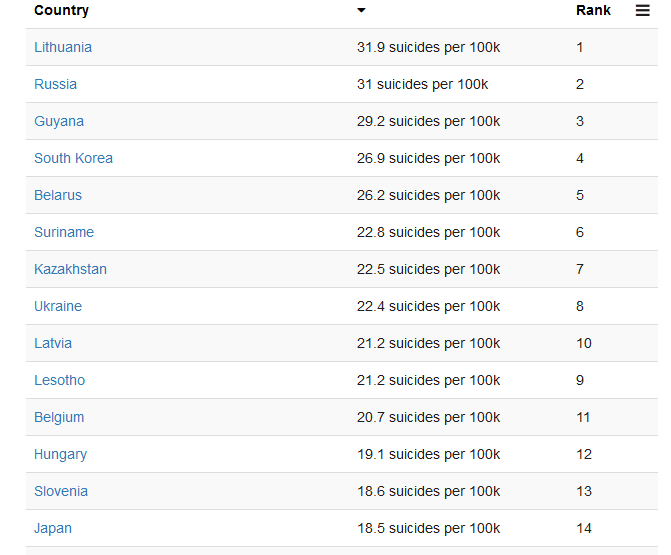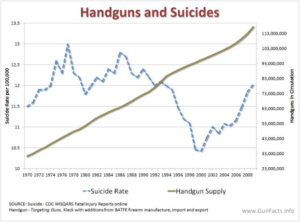
I generally only use Twitter to track quick-breaking news stories, and I follow all the major news outlets from BBC to the Washington Times. British magazine the Economist is on my list of must-reads every week, and generally it’s pretty trustworthy when it reports on world events, business, and finance. But, the magazine is ultimately left-leaning when it comes to certain social issues, so I wasn’t surprised when I saw the magazine’s Twitter feed claiming that our suicide rates would “crash” if Americans just gave up their guns.
 The article is filled with several obfuscations and outright lies I want to address in this post, and the bent is most certainly on the side of “government must fix.” What I was really shocked by is the obviously biased research and faulty numbers cited in this piece that claims the United States is seeing suicide rates rise, while some of the world’s nastiest shitholes are seeing suicides crash! Yay, Russia! *rolls eyes*
The article is filled with several obfuscations and outright lies I want to address in this post, and the bent is most certainly on the side of “government must fix.” What I was really shocked by is the obviously biased research and faulty numbers cited in this piece that claims the United States is seeing suicide rates rise, while some of the world’s nastiest shitholes are seeing suicides crash! Yay, Russia! *rolls eyes*
See, Russians now know how to get by without the state, says a Russian psychiatrist, and they’re less likely to kill themselves, because they’re living healthier lives and drinking less. They’re earning more, and they’re living better, and unemployment is on the decline. Ergo, there are fewer suicides. And yet, despite the ostensible decline, Russia is still second in the world in suicide rates – only slightly behind Lithuania.
 And yet, the Economist celebrates Russia’s success in reducing its ridiculously high rates of suicide, while gently chiding US gun ownership as the reason for our increasing rates of suicide.
And yet, the Economist celebrates Russia’s success in reducing its ridiculously high rates of suicide, while gently chiding US gun ownership as the reason for our increasing rates of suicide.
But the main means of suicide in America is guns. They account for half of suicides, and suicides account for more firearms deaths than homicides do. Guns are more efficient than pills, so people who impulsively shoot themselves are more likely to end up in the morgue than in the emergency ward. According to Matthew Miller of Harvard University, gun-ownership levels largely explain the variation in suicide rates, which range from 26 per 100,000 in Montana to five in Washington, DC. If America gave up its guns, suicides would crash.
 Suicides account for two-thirds of all firearm deaths in the United States, and yet as handgun ownership has been rising over the years, suicides have been fluctuating from year to year.
Suicides account for two-thirds of all firearm deaths in the United States, and yet as handgun ownership has been rising over the years, suicides have been fluctuating from year to year.
Statistics can only make educated guesses about how many people in the United States own guns, and that number is generally underestimated, given just how many owners seem to be accident prone in the water and have lost their guns in tragic boating accidents (read: will not admit to having firearms or to how many firearms they actually own). There are likely much more guns in circulation than are reported, and yet, the United States (25) falls below “civilized” places such as Finland (23), Switzerland (18), and France (17). Japan, which has essentially banned private gun ownership, boasts 18.5 suicides per 100,000 people.
Lithuania has the dubious honor of being first on the list for suicide rates in the world, with 31.9 people per every 100,000 having taken their own lives this year, with an estimated 385,000 guns – both legal and illegal – in circulation, compared with an estimated nearly 400 million guns in civilian hands in the US. In Lithuania, one must undergo psychiatric evaluations in order to get a firearms license, and yet, the tiny Baltic country has the highest suicide rate in the world.
I don’t want to get mired in statistical weeds, but you can see my point. There is very little correlation between firearm ownership and suicides, despite what the infamously biased “research” funded by gun-grabbing billionaires Matthew Miller of Harvard has claimed over the years. Suffice it to say that if a person wants to end their life, they will do so – with any tool they have available.
Americans will not give up their rights based on biased research and political opportunism.
Mental health resources need to be improved and we all need to be more aware of those around us who may need help. The focus needs to be on suicide, not on the tool used to commit it. Doctors can and should assess the mental health of their patients, before asking intrusive questions about firearm ownership – a subject about which many doctors are woefully uninformed, which only serves to destroy their credibility with gun owners and paint them as politically motivated, rather than well-intentioned.
An interesting coalition has recently formed in Colorado aimed at preventing suicides.
Doctors across the U.S. have become increasingly vocal in addressing gun violence as a public health crisis, a posture that recently has drawn the wrath of the National Rifle Association.
Yet, in Colorado, a diverse group that includes doctors, public health researchers and gun shop owners has come together to bridge this divide. The Colorado Firearm Safety Coalition has found common ground on at least one issue: preventing firearm suicide.
The group’s motto: “fighting suicide, together.”
This group does not appear to be focused on policy, and has no intention of infringing on the rights of law-abiding citizens to keep and bear arms. It teaches doctors about firearms, giving them “cultural competency” to credibly discuss firearms ownership with their patients, should the need arise. It provides gun retailers with pamphlets discussing suicide prevention that encourage people to lock up their guns or temporarily give them to a friend or relative if they’re going through a rough time. And some gun shops are training their staff to be on the lookout for customers exhibiting signs of mental distress: “Can’t answer questions. In a hurry. Not engaging. They just want to make the purchase and get out.”
Obviously, not all customers who don’t want to hang out and chat airily are suicidal, but I think there’s a case to be made that if something doesn’t feel right, it probably isn’t, and sales people do need to be aware.
Bristlecone salesman and firearms instructor Steve MacGregor recalls one customer who came in looking to buy a gun: “His lip was quivering, he was looking down a lot at the floor, making no eye contact.”
MacGregor says the man told him his wife had just filed for divorce.
“We said, ‘You know, this just isn’t a good time. I can see a lot of emotion on your face. I think you really should take some time and just cool off,’ ” MacGregor says. “He thanked us for the way we reacted to him, and he left. And I have seen him come back in here.”
I am a Second Amendment purist, who opposes any government infringement on our right to keep and bear arms. That said, I’m not without common sense. I do believe that sales people in gun stores can and should be observant of behaviors that may end up in tragedy. I do believe that doctors can and should talk honestly with patients who might be going through a tough time about temporarily locking up their guns or even giving them to a trusted friend or family member. I do believe that family members need to intervene in cases like Adam Lanza’s – the Sandy Hook murderer who exhibited so many red flags, the Kremlin would have been envious – whose severe mental illness went untreated, resulting in one of the worst tragedies in our nation’s history.
Helping people going through a rough time will almost certainly save lives. Giving up our right to keep and bear arms because mental health resources are sorely lacking in our country will not.
Featured photo courtesy of Oleg Volk.
our suicide rates would “crash” if Americans just gave up their guns
Because all those suicides were caused by guns, not enacted by firearms.
*smdh*
while gently chiding US gun ownership as the reason for our increasing rates of suicide.
HUH?!? We don’t even make it onto that chart! How is our suicide rate something to even be concerned with, then?
(Anyone else notice a certain preponderance on that chart? An awful lot of former Soviet states and client states in that top 14.)
According to Matthew Miller of Harvard University, gun-ownership levels largely explain the variation in suicide rates
Oh, well, then, by all means, we should just bow to the mighty intellect of this totally unknown dude from an important school.
You know, real journalism would establish *why* I should listen to this guy before demanding that I do so.
with an estimated 385,000 guns – both legal and illegal – in circulation, compared with an estimated nearly 400,000 guns in civilian hands
OK, I’m misreading this, or something. It makes no sense to me. You appear to have given two numbers for the same statistic, in the same sentence. Redundant and contradictory.
there’s a case to be made that if something doesn’t feel right, it probably isn’t, and sales people do need to be aware
Absolutely. And where it will turn bad is when it’s made into a policy, instead of an engagement.
BTW, Marta, I’ve seen the leftist influence in The Economist‘s news stories for almost two decades. Even their straight stories are often slanted, and sometimes leave out facts in order to establish the marxist narrative. Though I do remember a day when they were a bit more honest (like in the 80s).
Oh, felgerkarb, I missed a closing “em” tag on the second quote.
Sorry.
If you don’t like suicide, don’t commit it. Next problem please.
It is a contradiction that the Economist rants about US suicide rates but in Europe, euthanasia is becoming more common and even desired by the state. So I guess suicide is OK when the state does it.
The United Nations wants the U.S. to limit, while working up to a total ban, our privately held firearms. This Economist article is just part of that “movement.”
A gun may be more efficient than pills, but NO one survives gravity, if administered for more than 6 floors or equivalent, and that is pretty much universally available. Many suicide attempts, even with guns, are cries for help and are not intended to be effective, but if you step off a tall building you are pretty much determined.
Where’d you get that Rohm RG-10? Can I have it, please? I bought one for $15 back in ’82, but gave it to a friend of mine who was actually able to hit squirrels with it, and I would love to have another one. I’ll bet I still have a box of .22 shorts somewhere for it.
12 Comments